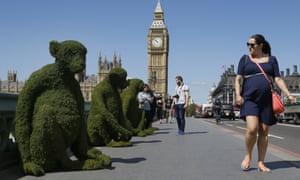Programme in partnership with World Land Trust will create corridors of natural habitat to prevent threatened species from being cut off from each other

A programme to regenerate thousands of acres of forest and link habitats in wildlife-rich parts of the world has been launched.
The “bio-bridges” scheme, which creates corridors of natural habitat to prevent threatened wildlife populations being cut off from each other, is being run by the Body Shop in partnership with the World Land Trust.
Every customer purchase will help to restore and protect one square metre of habitat, the company pledges, with aims to protect 75 million square metres, or more than 18,500 acres of land.
The first project is in Vietnam, in the Khe Nuoc Trong forest, which is home to rare wildlife including an endangered primate, the red-shanked douc, the critically endangered saola, or Asian unicorn, the Bengal slow loris and the Burmese python.
Roger Wilson, head of conservation at the World Land Trust, said one of the biggest threats to wildlife was fragmentation of their habitat, leaving isolated populations that were too small to be viable.
“Animals have to be able to move from A to B, there has to be flow between them, otherwise they are divided up, they become isolated individually, they are far away. The bridges allow that to happen.”
He said the “bio-bridges” were located in the most important areas, with rich biodiversity, and it was important to ensure communities felt the benefits of preserving the wildlife corridors.
In Vietnam, the area of forest being targeted by the scheme is degraded, with much of it converted to plantations, Wilson said.
“The remaining natural forest suffers illegal logging because of the high value timbers that make rich oriental furniture. The other thing is immense hunting pressure.”
The scheme will involve regular patrols and utilising camera traps to protect the area and its wildlife, and working closely with the local community and schools to encourage using forest resources, farming sustainably and getting involved with the project.
There are also plans for a second bio-bridge project launch in the Garo Hills, India, which has one of the biggest remaining wild Asian elephant populations.
Christopher Davis, director of corporate responsibility and campaigns at the Body Shop said: “Bio-bridges are an innovative way to create protected corridors of biodiversity that allow the wider forest to flourish and its inhabitants to breed and thrive.
“In Vietnam, within five to 10 years we hope to be able to see endangered species multiply.

